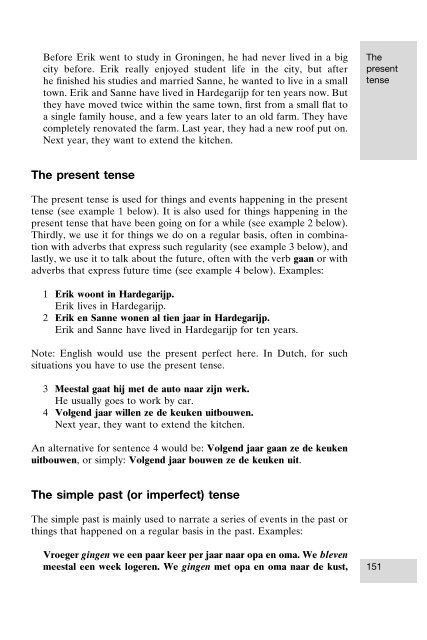er - Home
er - Home
er - Home
You also want an ePaper? Increase the reach of your titles
YUMPU automatically turns print PDFs into web optimized ePapers that Google loves.
Before Erik went to study in Groningen, he had nev<strong>er</strong> lived in a big<br />
city before. Erik really enjoyed student life in the city, but aft<strong>er</strong><br />
he finished his studies and married Sanne, he wanted to live in a small<br />
town. Erik and Sanne have lived in Hardegarijp for ten years now. But<br />
they have moved twice within the same town, first from a small flat to<br />
a single family house, and a few years lat<strong>er</strong> to an old farm. They have<br />
completely renovated the farm. Last year, they had a new roof put on.<br />
Next year, they want to extend the kitchen.<br />
The present tense<br />
The present tense is used for things and events happening in the present<br />
tense (see example 1 below). It is also used for things happening in the<br />
present tense that have been going on for a while (see example 2 below).<br />
Thirdly, we use it for things we do on a regular basis, often in combination<br />
with adv<strong>er</strong>bs that express such regularity (see example 3 below), and<br />
lastly, we use it to talk about the future, often with the v<strong>er</strong>b gaan or with<br />
adv<strong>er</strong>bs that express future time (see example 4 below). Examples:<br />
1 Erik woont in Hardegarijp.<br />
Erik lives in Hardegarijp.<br />
2 Erik en Sanne wonen al tien jaar in Hardegarijp.<br />
Erik and Sanne have lived in Hardegarijp for ten years.<br />
Note: English would use the present p<strong>er</strong>fect h<strong>er</strong>e. In Dutch, for such<br />
situations you have to use the present tense.<br />
3 Meestal gaat hij met de auto naar zijn w<strong>er</strong>k.<br />
He usually goes to work by car.<br />
4 Volgend jaar willen ze de keuken uitbouwen.<br />
Next year, they want to extend the kitchen.<br />
An alt<strong>er</strong>native for sentence 4 would be: Volgend jaar gaan ze de keuken<br />
uitbouwen, or simply: Volgend jaar bouwen ze de keuken uit.<br />
The simple past (or imp<strong>er</strong>fect) tense<br />
The simple past is mainly used to narrate a s<strong>er</strong>ies of events in the past or<br />
things that happened on a regular basis in the past. Examples:<br />
Vroeg<strong>er</strong> gingen we een paar ke<strong>er</strong> p<strong>er</strong> jaar naar opa en oma. We bleven<br />
meestal een week log<strong>er</strong>en. We gingen met opa en oma naar de kust,<br />
The<br />
present<br />
tense<br />
151


